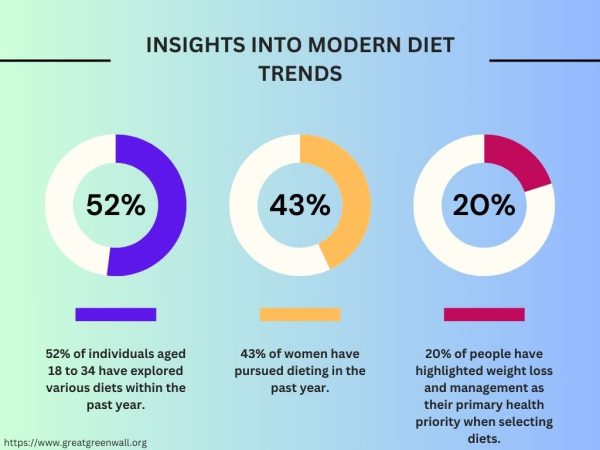In a time characterized by a growing consciousness towards health, dietary choices have become a focal point of discussion and experimentation for individuals around the world. Whether aiming for weight loss, athletic performance enhancement or ethical considerations, individuals find empowerment in dietary choices that align with their goals and values. Through exploration and engagement with diverse dietary philosophies, individuals can optimize their health while reflecting on their lifestyle choices.
- Vegetarian Diet
Vegetarianism revolves around abstaining from meat and seafood consumption while incorporating animal by-products like eggs, cheese, milk and honey into meals. Vegetarians maintain a diverse and nutritious diet by prioritizing plant-based foods such as fruits, vegetables, legumes, nuts, seeds and whole grains.
“I grew up with a vegetarian parent and I think that influenced my decision for sure. But I chose it because I stopped having an appetite for meat. I started to overanalyze the process of how my food got to me and it stopped being something I wanted,” senior Evita Duplessis said.
Vegetarians aim to include a variety of nutrient-rich foods in their diet. This includes consuming at least five 80-gram portions of fruits and vegetables daily and incorporating starchy carbohydrates such as potatoes into meals. Vegetarians may also choose dairy or fortified plant-based alternatives for calcium and protein, relying on plant-based protein sources like beans and pulses. Additionally, vegetarians limit their intake of high-fat, high-salt and high-sugar foods to maintain overall health and balance.
“Eating out [as a vegetarian] is a big challenge. I usually end up with very few options or variety when I go out with friends and family. They like [to eat at] burger and wing spots more than anything, so there’s fries and mozzarella sticks and sometimes a nachos option,” Duplessis said.
- Vegan Diet
Vegans avoid consuming any animal products, including meat, dairy, eggs and seafood. Beyond diet, vegans also refrain from using or purchasing products derived from animals, such as leather, wool and cosmetics tested on animals. The philosophy behind veganism encompasses ethical, environmental and animal welfare concerns.
A vegan diet actively centers around plant-based foods, including fruits, vegetables, legumes, whole grains, nuts, seeds and plant-based oils. In addition to these staples, vegans actively incorporate fortified foods like cereals, juices and nutritional yeast into their diets to ensure adequate nutrient intake. Plant-based alternatives such as tofu, tempeh and meat substitutes, as well as dairy alternatives derived from soy, almonds or oats, provide protein and other essential nutrients.
- Ketogenic Diet
Individuals following the ketogenic diet (keto diet) aim to derive calories from protein and fat and stay away from carbohydrates. They typically restrict their intake of easily digestible carbs, such as sugar, soda, pastries and white bread. This diet focuses on short-term weight loss rather than pursuing long-term health benefits. While weight loss remains a common goal for users, the keto diet has also shown potential in managing certain medical conditions, including epilepsy, heart disease, brain diseases and acne.
On the keto diet, individuals can eat a variety of foods, including seafood, meat, non-starchy vegetables, berries and high-cocoa chocolate. Selected for their low carbohydrate content and high fat and protein content, these foods help to induce a metabolic state known as ketosis. In ketosis, the body burns fat for fuel instead of carbohydrates, leading to weight loss and other potential health benefits.
Adhering to any diet may provide several health benefits, including improved cholesterol levels, lowered blood pressure, weight management and reduced risks of heart disease, type 2 diabetes and certain cancers. However, the extent of these benefits depends on the quality of the diet. Poorly planned diets may lead to deficiencies of crucial nutrients such as proteins, omega-3 fatty acids and vitamin B-12 if not balanced properly.












